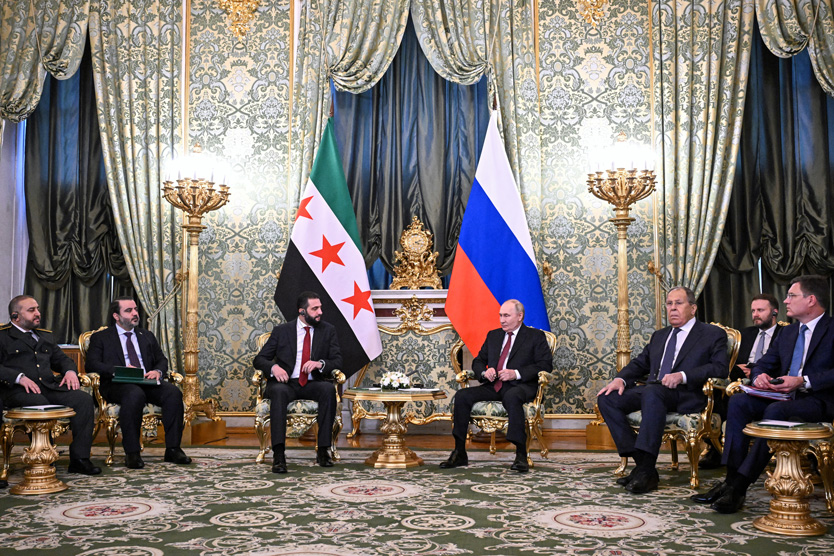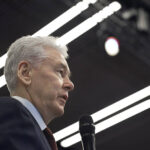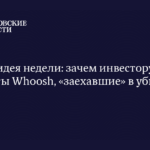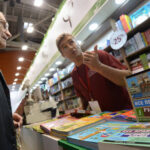Russian President Vladimir Putin and Syrian leader Ahmed al-Shara held negotiations in the Kremlin. The Russian side was represented by Foreign Minister Sergey Lavrov, Deputy Prime Minister Alexander Novak, Defense Minister Andrey Belousov, Presidential Aide Yuri Ushakov, and Deputy Head of the Presidential Administration Maxim Oreshkin.
Vladimir Putin’s Statements
Putin emphasized that relations between Russia and Syria have always been exceptionally friendly.
Our countries have developed special relations over many decades. For over 80 years we have maintained diplomatic relations, which were established during the most difficult times for Russia, for the Soviet Union – in 1944.
The Russian leader also noted deep ties with the Syrian people. He expressed hope that Syrian citizens studying in Russia would be able to contribute to the development of their country.
Currently, over 4,000 young Syrians are studying in higher education institutions of the Russian Federation. I very much hope that in the future they will make their significant, substantial contribution to the development and strengthening of Syrian statehood.
He also called the recently held parliamentary elections in Syria a “great success” and a step toward consolidating society.
Syria is currently going through difficult times, but this will strengthen ties and cooperation between all political forces in Syria.
The Russian President also stated that Russia is ready to hold regular consultations with Syria through the Russian Foreign Ministry.
Ahmed al-Shara’s Statements
The interim President of Syria thanked Putin for the reception. The country’s new authorities intend to restart relations with Russia.
We are also connected by serious bridges of cooperation, including material ones, and we will continue working, trying to restart the complex of our relations.
Al-Shara also noted that Syria respects all previously signed agreements between Moscow and Damascus. He added that Russia will play a significant role in the development of the new Syrian state. He also stated that Syria counts on many achievements that Russia has enabled it to accomplish in various spheres.
What Else Was Discussed at the Russian-Syrian Negotiations
The negotiations continued behind closed doors. The day before, it was reported that, in addition to the current development of relations between Syria and Russia, the parties would discuss the situation in the Middle East and might address the issue of Russian military bases in the country – in Tartus and Hmeimim.
In turn, media reported that Ahmed al-Shara during negotiations with the Russian leader would demand the extradition of former Syrian leader Bashar al-Assad as part of the case of his “crimes against Syrians.”
It was reported that Russian and Syrian leaders discussed specific projects in the fields of energy, transportation, and healthcare. The development of tourism, cultural spheres, and humanitarian aid were also discussed. According to reports, the Syrian side is interested in supplies of wheat, food, and medications.
Additionally, it was announced that Russia is ready to provide support and participate in the reconstruction of Syria.
We are ready to provide support and participate in the reconstruction of Syria… This concerns energy infrastructure, transportation, and Russia can provide support here. Including our companies being interested in developing transportation infrastructure and restoring energy facilities.
Kremlin
The Kremlin is a historic fortified complex at the heart of Moscow, serving as the official residence of the President of Russia. Originally constructed in the 12th century as a wooden fortress, it was rebuilt in brick in the 15th century and has since been the political and religious center of Russian power. Today, it is a UNESCO World Heritage site, famous for its cathedrals, palaces, and the iconic Kremlin Wall.
Tartus
Tartus is a historic port city on Syria’s Mediterranean coast, originally founded by the Phoenicians. It later became a major Crusader stronghold, known as Tortosa, and its old town still features a well-preserved 12th-century cathedral. Today, it remains a vital harbor city and is also home to a Russian naval facility.
Hmeimim
Hmeimim is a coastal town in Syria that gained international prominence in 2015 with the establishment of the Russian-run Hmeimim Air Base. This military facility serves as a key strategic outpost for Russia’s operations in support of the Syrian government during the ongoing Syrian conflict. While the town itself has a longer local history, its modern significance is almost entirely tied to this major foreign military presence.
Russian Federation
The Russian Federation is the world’s largest country, spanning Eastern Europe and northern Asia, with a history that dates back to the Kievan Rus’ state of the 9th century. It became a major global power as the Russian Empire and later the core of the Soviet Union before re-establishing itself as a federal republic in 1991. The nation is renowned for its vast landscapes, rich cultural heritage in literature, music, and art, and iconic landmarks like the Kremlin and Red Square in Moscow.
Soviet Union
The Soviet Union was a socialist federal state that existed from 1922 to 1991, formed after the Russian Revolution. It was a one-party state governed by the Communist Party, with a centrally planned economy and a dominant role in global affairs as a superpower during the Cold War. The union dissolved in 1991, fragmenting into 15 independent post-Soviet states.
Moscow
Moscow is the capital and largest city of Russia, with a history dating back over 800 years to its first recorded mention in 1147. It grew from a medieval fortress, the Kremlin, to become the political and cultural heart of the Russian state. The city is famed for its iconic landmarks, including Red Square, St. Basil’s Cathedral, and the historic Moscow Metro.
Damascus
Damascus is the capital of Syria and one of the oldest continuously inhabited cities in the world, with a history spanning over 11,000 years. It has been ruled by various empires, including the Romans, Umayyads, and Ottomans, which have all left their mark on its rich cultural heritage. The city is renowned for its historic Old City, a UNESCO World Heritage site, which houses the magnificent Umayyad Mosque and the bustling Al-Hamidiyah Souq.
Middle East
The Middle East is a transcontinental region centered on Western Asia and Egypt, historically known as the “Cradle of Civilization” as it was home to the earliest human civilizations, including Mesopotamia and Ancient Egypt. It is the birthplace of major world religions such as Judaism, Christianity, and Islam, and its history has been profoundly shaped by the rise and fall of empires, trade along the Silk Road, and the discovery of vast oil reserves in the modern era. Today, it remains a region of immense geopolitical, cultural, and economic significance.




